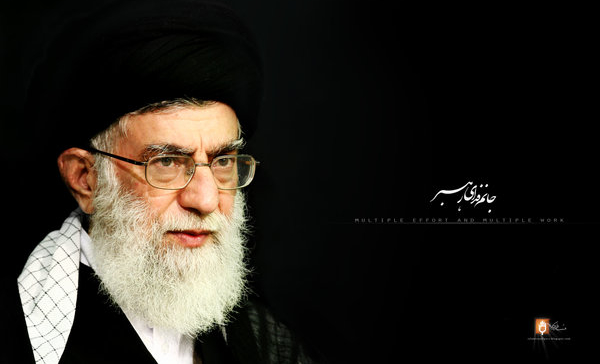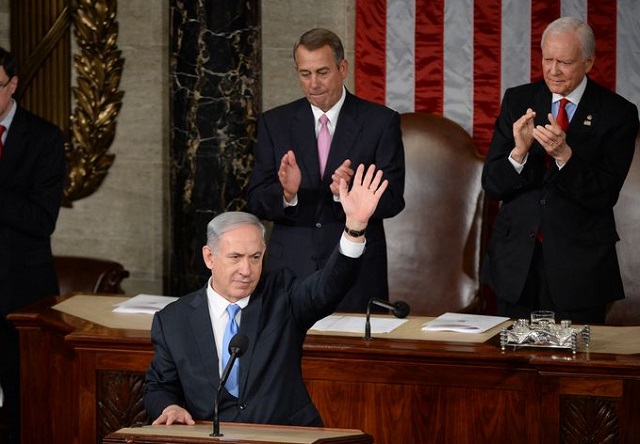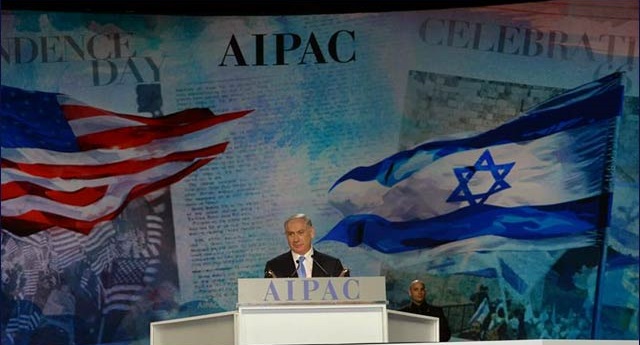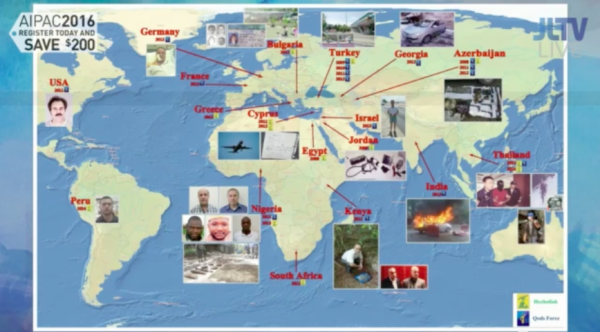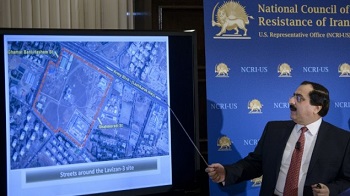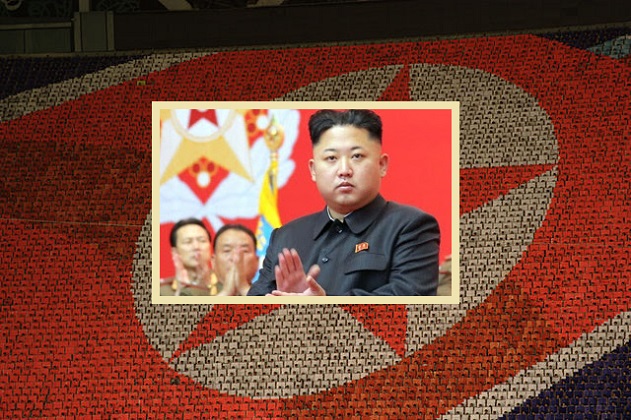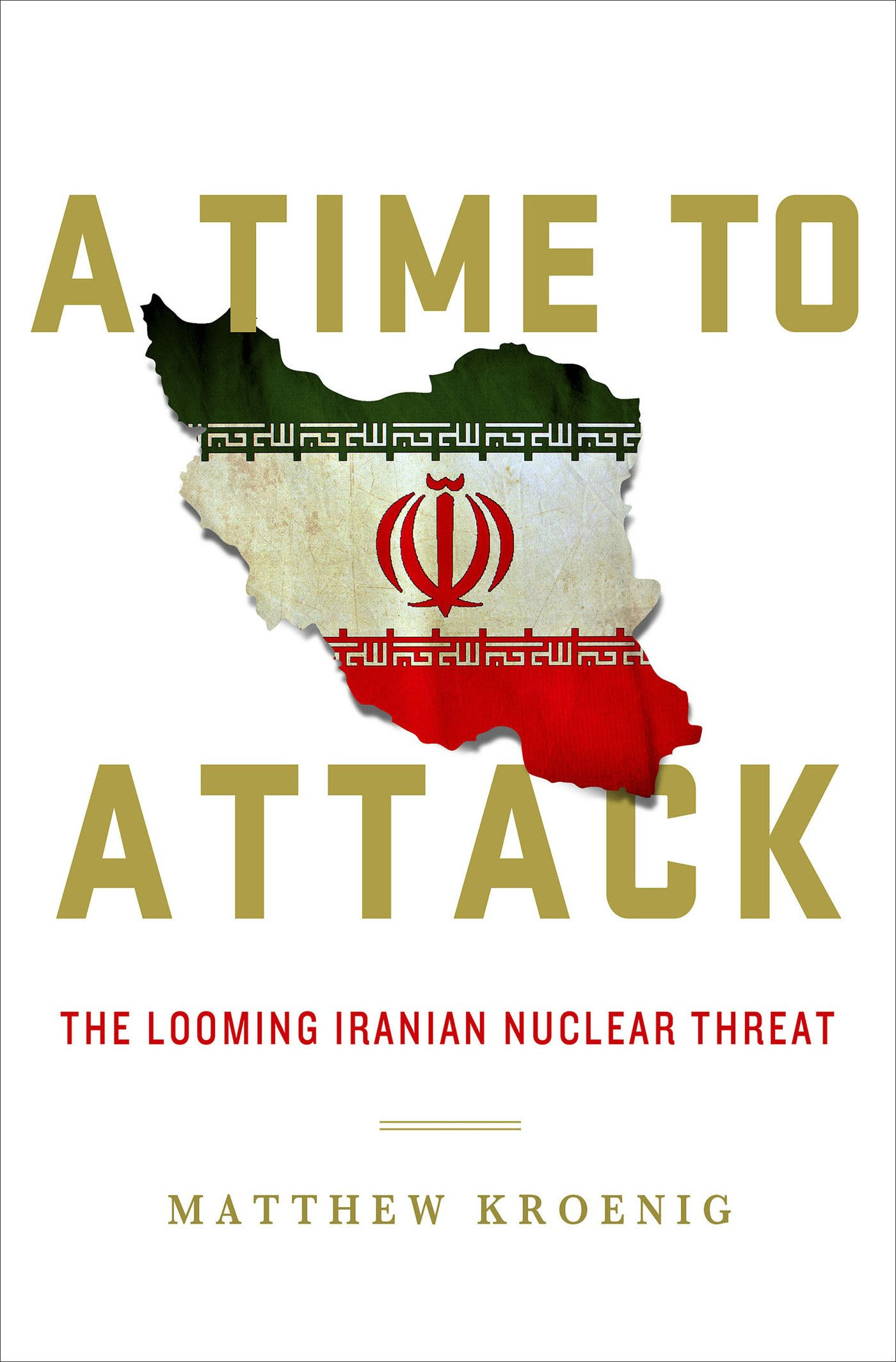On Tuesday, March 3, Israeli Prime Minister Benyamin Netanyahu laid out in an address before a joint meeting of Congress, a compelling rebuttal to the President’s case for the phased deal with the Islamic Republic of Iran. He diplomatically paid court to President Obama for supplying both known and secret support for the Jewish nation of Israel.
We didn’t need Israel’s Prime Minister Benjamin Netanyahu to come tell us how big a threat a nuclear enabled Iran will be. Well-informed Americans already know that Iran’s acquisition of a nuclear weapons production capability in the hands of an apocalyptic regime , will fan the flames of war in the Middle East and put the entire world at risk.
This is a regime whose rulers are sowing seeds of chaos in preparation for the coming of their messiah, the Twelfth Imam.
Netanyahu’s message to a packed house in a Joint Meeting of Congress was clear, concise, and spelled out starkly the issues and the choices we face.
Watch this C-span Video of Israeli Prime Minister Benjamin Netanyahu’s address before the Joint Meeting of Congress on March 3, 2015:
An affronted delegation. Visually absent from the joint meeting were 50 Democrat members of both Chambers, who chose to demonstrate their partisan loyalty to their party and the President. At issue was misplaced sense that the President had been slighted, represented by Netanyahu’s presence before the Joint Meeting of Congress, because the visit was organized by House Speaker John Boehner without consultation with Obama. That no representative of the Obama administration was present as well showed how petulant partisan politicians, even at the highest levels, can be when faced with what they perceive as slights, real or imagined.
By avoiding the Prime Minister’s speech, they also missed the more than 40 rounds of standing ovations that punctuated his remarks. More importantly they failed to observe minimum protocols of courtesy due to a visiting head of state. In this case, when the object of their anger is the head of state of one of America’s closest allies, their lack of courtesy is shameful.
According to reports from reliable sources, the President was “infuriated” by Netanyahu’s speech to Congress. However, because Netanyahu’s speech was full of praise for Obama and his generous assistance and support of Israel, all Obama could say was that Netanyahu didn’t present anything new or “any viable alternatives”. That became the veritable chorus from his White House spokespersons and in some quarters of the mainstream media. So bitter was the vitriol that one of Netanyahu’s detractors suggested that the Prime Minister’s speech was ‘racist’ because it was critical of America’s first minority President. A group of African American pastors responded by coming out in support of Netanyahu’s speech and went on record in a news conference to disagree with this bizarre comment, promising that they would stand with Israel.
The Prime Minister’s speech was framed in history. Israel’s Prime Minister came to inform Americans about the seriousness of the threat represented by a nuclear Iran. He began the body of his speech by placing his remarks in an historical context.
He explained to the Congressional audience that the ancient Jewish Festival of Purim would begin the following evening. The holiday commemorates another Persian government, some 2,500 years ago, when Haman, Vizier to the Persian Emperor Xerxes (also known as Ahasuerus) singled out the entire Jewish population for slaughter. They were saved by Queen Esther and her uncle, Mordechai, and given permission to defend themselves against the massive pogrom that had been planned against them. Netanyahu then drew the parallel between this ancient plot against the Jews of Persia and the current threats against the Jewish State of Israel by the mullahs of Iran, the current government in the modern-day land of ancient Persia.
Bringing history a bit closer to home, Netanyahu made copious references to the Holocaust. He introduced, for recognition and applause, Nobel Laureate and Holocaust Survivor Elie Wiesel, who sat in the Speaker’s Box as an honored guest of the Prime Minister and his wife, Sara. Wiesel, who is a personal friend of the President, came nevertheless as Netanyahu’s guest. “Although he has deep affection for the President”, in the words of his friend, Rabbi Shmuley Boteach, “he didn’t feel saying that the Jewish people face danger would be an offensive message.”
These historical connections, creating links between the ancient threat of a Persian viceroy, the more recent catastrophe of the Holocaust, and the current threats of the apocalyptic reign of Shia Mahdists in Tehran, covered two thousand years of history of the Jewish experience. Today’s threat is hardly less significant. Whether from the Ayatollah Khamenei or the alleged moderates in his government, President Rouhani and Foreign Minister Zarif, they, like Haman, are determined to wipe Israel, ‘the Zionist Enterprise” off the map of the world. In the words of Hezbollah’s retired Brig. Gen. Walid Sakariya, the nuclear weapons Iran is developing are intended to “create a balance of terror with Israel” and “finish off the Zionist enterprise.”
Netanyahu also reminded his audience that Israel is the bastion for world Jewry under anti-Semitic assault in the West and throughout the Muslim world. He warned that it would, out of necessity, defend itself against both conventional and non-conventional threats by Iran and its proxies:
This is why — this is why, as a Prime Minister of Israel, I can promise you one more thing: Even if Israel has to stand alone, Israel will stand. But I know that Israel does not stand alone. I know that America stands with Israel.
Netanyahu also put in historical context Iran’s continuing war against the West. He referenced Tehran’s secret war against America, Israel, and Jews that began with the Islamic Revolution in 1979 with the seizure of the American Embassy in Tehran and the hostage crisis that lasted 444 days, a war that still continues.
He spoke of the hundreds if not thousands of American soldiers and diplomats who were killed by Iranian Quds Force and their proxies, Hezbollah, Palestinian Islamic Jihad and Hamas in locations like Lebanon, Saudi Arabia, East Africa, Iraq and Afghanistan.
He spoke of the hundreds if not thousands of Jews who were killed in actions across five continents. Witness as examples the 1992 bombing of the Israeli Embassy and 1994 AMIA Jewish Center blasts in Buenos Aires, Argentina and, more recently the bombing of an Israeli tourist bus in Burgas, Bulgaria by Hezbollah operatives.
Netanyahu aptly pointed out that the Iranian Constitution crafted by these Mahdists said that the purpose of the Islamic Revolution was to export Jihad around the world. Unlike the US, he said, which was founded on the promise of “Life, Liberty, and the Pursuit of Happiness”, Iran’s founding documents promised, “Death, tyranny, and the pursuit of jihad.”
Netanyahu also warned his Congressional audience and those watching live from around the globe that Iran’s apocalyptic version of militant Islam comes from the source and that their current assault against ISIS should not fool us into adopting the ancient Arab maxim, ‘the enemy of my enemy is my friend’. “When it comes to Iran and ISIS,” he said, “the enemy of your enemy is your enemy.”
Iran as the agent of global jihad. Among the most egregious of Iran’s involvement in attacks against the US, was the connivance with Al Qaeda in facilitating the training of many of the 9/11 perpetrators by the late Hezbollah terrorist mastermind, Imad Maghniyah. That was revealed in affidavits by former Iranian intelligence operatives in the Federal Iran 9/11 links case.
More recently, we have the revelations of collusion between the Shia Iran and Sunni Al Qaeda in e-mails from the treasure trove of information captured by US Navy Seal Team Six during the assassination of the late Osama bin Laden in Abbotabad, Pakistan.
Then there is the evidence of Iran’s Quds Force assisting the launch of ISIS in Syria. This is ironic now that the IRGC is leading Iraqi military forces against ISIS in the attack on the late Saddam Hussein’s birthplace of Tikrit, which was captured by ISIS. Meanwhile, the Pentagon is placed in the precarious and unwelcome position of standing by while Iran expands its reach and forwards its agenda.
Open Source Intelligence as the basis for Netanyahu’s warning. The heart of Netanyahu’s message was conveyed halfway through his speech. It was based, he said, on information available on many public open sources which he invited his audience to “Google”. This was intended to quell any concerns raised by Obama that he would release classified intelligence that could torpedo negotiations with Iran. Many of the details of the ‘deal’ had already been leaked and were in the public domain. So he continued.
“We’ve been told,” he said, “that no deal is better than a bad deal. Well this is a bad deal, a very bad deal.” Instead, he pointed out, “this deal has two major concessions: one, leaving Iran with a vast nuclear program; and two, lifting the restrictions on that program in about a decade. That is why this deal is so bad. It doesn’t block Iran’s path to the bomb; it paves Iran’s path to the bomb.”
So why would anyone make this deal? Netanyahu posited this theory: “Because they hope that Iran will change for the better in the coming years, or they believe that the alternative to this deal is worse?”
Netanyahu used the petard of Ayatollah Khamenei’s own tweets, echoed by Secretary Kerry in testimony before the House Foreign Affairs Committee about the future chaos wrought by this worse deal. He said, “My long-time friend, John Kerry, Secretary of State, confirmed last week that Iran could legitimately possess that massive centrifuge capacity when the deal expires.”
The State Department immediately accused him of taking Kerry’s Congressional testimony out of context, but here is Kerry’s own testimony, which makes the point abundantly clear:
Iran’s Supreme Leader says that openly. He says, Iran plans to have 190,000 centrifuges, not 6,000 or even the 19,000 that Iran has today, but 10 times that amount — 190,000 centrifuges enriching uranium. With this massive capacity, Iran could make the fuel for an entire nuclear arsenal and this in a matter of weeks, once it makes that decision.
Netanyahu then painted a dystopian vision for the World and the Middle East region, should Iran, already a global sponsor of terrorism, become a nuclear threshold state and open the Pandora’s Box of nuclear proliferation:
Israel’s neighbors — Iran’s neighbors know that Iran will become even more aggressive and sponsor even more terrorism when its economy is unshackled and it’s been given a clear path to the bomb.
And many of these neighbors say they’ll respond by racing to get nuclear weapons of their own. So this deal won’t change Iran for the better; it will only change the Middle East for the worse. A deal that’s supposed to prevent nuclear proliferation would instead spark a nuclear arms race in the most dangerous part of the planet.
This deal won’t be a farewell to arms. It would be a farewell to arms control. And the Middle East would soon be crisscrossed by nuclear tripwires. A region where small skirmishes can trigger big wars would turn into a nuclear tinderbox.
If anyone thinks — if anyone thinks this deal kicks the can down the road, think again. When we get down that road, we’ll face a much more dangerous Iran, a Middle East littered with nuclear bombs and a countdown to a potential nuclear nightmare.
Netanyahu drew attention to the looming threat of Iran’s missile program and military nuclear developments, excluded from the proposed Memorandum of Understanding being word smithed in Geneva by Secretary Kerry and Iranian Foreign Minister Zarif:
The U.N.’s nuclear watchdog agency, the IAEA, said again yesterday that Iran still refuses to come clean about its military nuclear program. Iran was also caught — caught twice, not once, twice — operating secret nuclear facilities in Natanz and Qom, facilities that inspectors didn’t even know existed.
And by the way, if Iran’s Intercontinental Ballistic Missile program is not part of the deal, and so far, Iran refuses to even put it on the negotiating table. Well, Iran could have the means to deliver that nuclear arsenal to the far-reach corners of the earth, including to every part of the United States.
Iran’s Ongoing Progress Despite Negotiations. To buttress Netanyahu concerns about Iran’s nuclear military applications and ICBM program, we have just heard from reliable sources that the Islamic Republic has achieved a technical breakthrough – the miniaturization of nuclear warheads – through technical support from both China and North Korea so that nuclear warheads will be able to be installed on their slender Shahab missiles.
Less certain is whether experiments with nuclear triggers have succeeded, given several explosions that have occurred at the Lavizan sites near Tehran and at Parchin, the military explosives test center. If this report is separately confirmed it means that Iran would have the ability to load ICBMs with nuclear warheads.
If tests conducted in Caspian Sea by Iran and the purchase of container-launched missiles from Russia are an indication may provide the capability to deploy small yield nuclear detonations off the American coasts. Those could produce an Electronic Magnetic Pulse (EMP) attack, possibly disabling our less-than-secure power grid sending the country hurtling back to the pre-industrial age.
Even as the negotiations continue, the media ran a story about how Iran conducted cruise tetst attacks against a mock US aircraft carrier. Less covered but also last week, Iran launched a cruise missile from a submarine in the Persian Gulf. The missile has a range of 150 nautical miles and was designed to destroy a US carrier. So even as they sit at the negotiating table, the Iranians rattle their sabers and clearly demonstrate their animus.
Netanyahu’s Plan. Contrary to Obama’s comment that there was ‘nothing new’, Netanyahu was clear in firmly stating that the lifting of sanctions and restrictions must be justified by Iranian action in three areas:
- Stop its aggression against its neighbors in the Middle East;
- Stop supporting terrorism around the world; and,
- Stop threatening to annihilate my country, Israel, the one and only Jewish state.
Netanyahu’s plan was clear. Marco Rubio summed it up nicely: “Iran can have an economy, or it can have nuclear weapons. But it can’t have both.”
A closing thought from the Bible. Netanyahu concluded his address by pointing to the frieze of Moses high on the wall opposite from where he stood surrounding the House chamber. He recited and translated from the Hebrew Moses’ instructions in his final address to the ancient Hebrews about to cross the Jordan and enter the Promised Land:
Before the people of Israel entered the land of Israel, Moses gave us a message that has steeled our resolve for thousands of years. I leave you with his message today, “Be strong and resolute, neither fear nor dread them.”
My friends, may Israel and America always stand together, strong and resolute. May we neither fear nor dread the challenges ahead. May we face the future with confidence, strength and hope.
A warning to be heeded. Netanyahu’s message in his address to Congress is not lost on Israelis and the preponderance of Americans, who view Iran’s possession of a nuclear weapon as a clear and present damage to the world. At issue is whether the Administration’s obsession with an agreement with Iran at all cost has blinded them to the consequences of a deal that would allow Iran to become a nuclear power.
This is not the time for peevishness. No insults were intended and none should be interpreted. Netanyahu’s visit and his speech were timely – a last minute call for clarity and resolve against an implacable enemy masquerading as a negotiating partner.
There are many who fervently believe that any negotiations with Iran will lead us dangerously close to a nuclear precipice. Perhaps, Netanyahu’s comments before Congress where prescient. Apparently, Iran has rejected the proposed phased deal placing negotiations in Geneva at an impasse.
Netanyahu’s ultimate message is clear: Iran’s nuclear clock is rocketing towards midnight. Can we stop it in time or will our own Munich in Geneva lead us into a nuclear doomsday scenario that, once begun, no one will be able to stop?
EDITORS NOTE: This column originally appeared in the New English Review. The featured image is of Israeli Prime Minister Benjamin Netanyahu Before Joint Meeting of Congress with Speaker John Boehner on left and Senate President Pro-temp Sen. Orrin Hatch on right on March 3, 2015.


